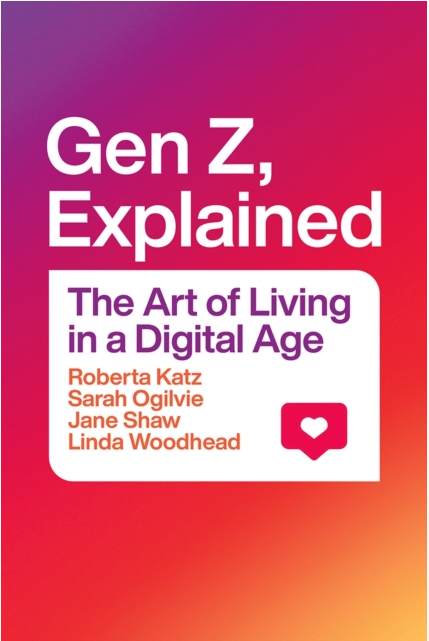
Gen Z: The art of living in a digital age
Jane Shaw introduces a multi-authored book which offers insights into Gen Z
In 2021, three colleagues (a sociologist, linguist and anthropologist) and I (an historian) published an interdisciplinary study of Generation Z –
Gen Z, Explained: The Art of Living in a Digital Age – about those born in 1995 or after, who have never known the world without the internet. We became convinced that older generations need to understand Gen Z and figure out how to work with Gen Zers to make the future better. We did surveys of that age group’s values across the general population in the USA and UK; conducted in-depth interviews with students at three very different campuses; and constructed a large database of Gen Z language scraped from social media.
Here are my reflections on what we learnt and what the churches need to grasp if they stand a chance of engaging Gen Z.
Religion It’s not so much that Gen Zers are against it, but it just doesn’t come up on their radar screens. They are largely indifferent. For the most part, religion hasn’t been transmitted to them so, if they are going to investigate it, that will have to happen from scratch. This means that those in the churches will need to figure out how to engage with Gen Z – from scratch.
Churches so often appear (and frequently act) as if they have all the answers for those outside institutional religion and little to learn from them. We need to begin by asking Gen Zers what is important to them. As the Anglican priest Vincent Strudwick says, “It’s no good taking people from where they aren’t to where they don’t want to go.”
Living in the Digital Age is what Gen Z has always (and only) known. Online and offline life are seamlessly connected and totally integrated for them, though they understand the value of offline encounters. Participating in gathered community online is something they are used to; online groups are essential areas of belonging and identity formation though affiliations are not necessarily permanent or even long term.
Gen Zers belong to groups as and how they make sense in relation to their identity and friend networks. It’s the equivalent of church hopping, and church hopping is exactly what we saw many – from all generations – doing online during the pandemic once they were given the opportunity to find what they liked for a particular time and season. Churches, struggling post-pandemic with how to win back congregations, might ask Gen Z for some advice on how you successfully combine and negotiate the online and offline, and work with people’s multiple affiliations. Gen Zers are brilliant at it.
Identity is central for Gen Z It is finely grained and carefully articulated, the result of a judicious sorting and selection of attributes. Gen Z’s identities also guide their affiliations and loyalties; the internet has allowed them to find people ‘like them’ in ways that were simply not possible before. If identity is important but religion is rarely one of the attributes of identity, then the churches will have to figure out how to engage with other aspects of Gen Z identities as a starting point. Given that sexual orientations (yes, many) and genders (yes, many) are key to Gen Z identity, the churches are already on the back foot. Engagement with race and ethnic identity are also absolutely vital. For Gen Zers this is all a matter of justice and, if they are going to engage with Church, they will want to see Gospel justice values reflected in Christian behaviour.
This brings us to
authenticity.
Gen Z-ers can sniff out inauthenticity from a mile off. Faced with sorting through a vast amount of information online from an early age, they have learnt the importance of finding what is authentic, what speaks to their experience and what is relevant or ‘relatable’ – a very Gen Z word.
Gen Zers care passionately about the environment and issues of equity and justice. They are sceptical of institutions, seeing them as broken or incapable of solving deep problems. They have, of course, inherited much from the liberation movements of the 1960s and 70s, although they don’t always recognise that, and they are sceptical about the capacity of older generations to address and tackle what seem like intractable problems.
Gen Zers who are part of the Church point out that their concerns flow out of their faith. In the book
Young, Woke and Christian, edited by Victoria Turner (2022), 15 younger Christians argue that issues like the climate crisis, sexual identity, disability justice, food poverty and racial justice are Gospel issues.
These are some of the big issues of our day, and it is vital that people of all generations, including Christians of all generations, bring together our different skills and insights to address them, and find shared generational hopes and values. To do so, we will need to keep listening to each other.
Gen Z, Explained: The Art of Living in a Digital Age was published in late 2021 by University of Chicago Press (paperback 2022) and is co-authored by Jane Shaw, Linda Woodhead, Roberta Katz and Sarah Ogilvie.
Could your church engage with the book and ask what insights and challenges it offers to your contexts? |
 |
A version of this article was previously published on the website ViaMedia News (March 2022), and we are grateful for permission to publish this edited version here.
 Jane Shaw
Jane Shaw is Principal of Harris Manchester College, Oxford, Professor of the History of Religion, and Pro-Vice-Chancellor at the University of Oxford. She is an honorary fellow of Regent’s Park College.
Click here to
download a pdf version of this article
Title image | Shutterstock.com
Photo | Robert Taylor